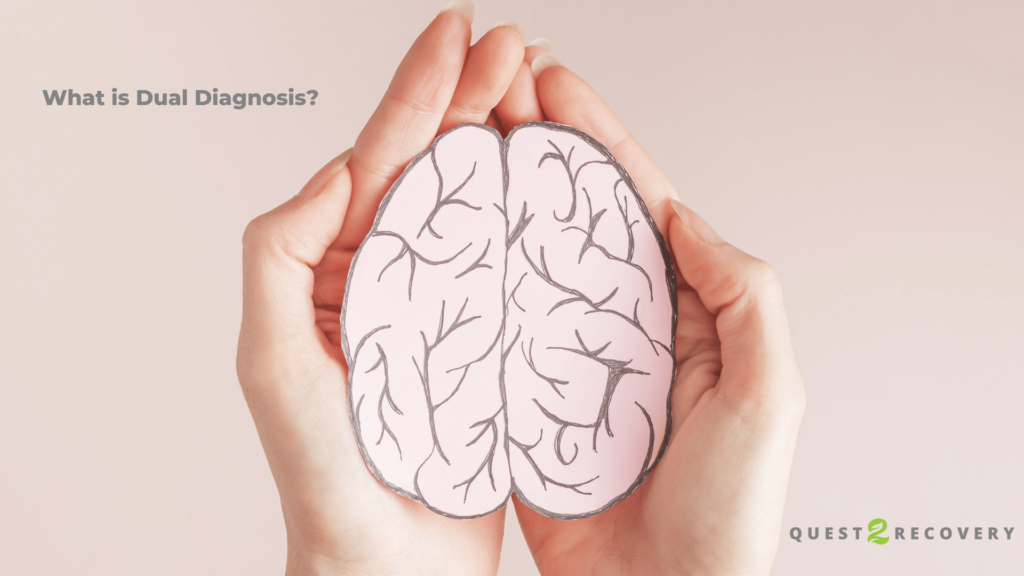Dual diagnosis, a term often encountered in the realm of addiction treatment, refers to the co-occurrence of substance abuse and mental health disorders. This complex condition affects a significant portion of those battling addiction, with the Substance Abuse and Mental Health Services Administration reporting that about 9.2 million U.S. adults experienced both mental illness and a substance use disorder in 2018. Understanding dual diagnosis is crucial, as it presents unique challenges and requires specialized treatment approaches. In this blog post, we will explore the definition of dual diagnosis, identify its symptoms, and discuss effective treatment methods, with a focus on the approaches used by Quest 2 Recovery in Lancaster, California.

What is Dual Diagnosis?
Dual diagnosis, also known as co-occurring disorders, is a term used when a person experiences a mental health disorder and a substance use disorder simultaneously. This condition can involve any combination of mental health disorders (like depression, anxiety, or bipolar disorder) and addiction (to drugs, alcohol, or prescription medication). The significance of dual diagnosis lies in its frequency and complexity; it is a common occurrence among those seeking treatment for addiction and poses unique challenges for both diagnosis and treatment.
The interconnection between mental health disorders and substance abuse is intricate. Often, mental health issues can lead individuals to self-medicate with drugs or alcohol, exacerbating both the addiction and the underlying mental health disorder. Conversely, substance abuse can trigger or worsen mental health problems. This bidirectional relationship makes dual diagnosis a particularly challenging condition to address.
In the next sections, we will delve into the symptoms of dual diagnosis, the challenges in diagnosing and treating this condition, and the specific treatment approaches, highlighting Quest 2 Recovery’s comprehensive and integrated methods for treating this complex condition.
How Can We Identify the Symptoms of Dual Diagnosis?
Recognizing dual diagnosis can be challenging due to the overlapping and intertwined symptoms of mental health disorders and substance abuse. However, some common indicators may signal the presence of co-occurring disorders. These symptoms often manifest in behavioral, physical, and psychological changes.
Behaviorally, individuals with a dual diagnosis might show sudden changes in behavior, neglect responsibilities, or engage in risky activities. There may also be an increased reliance on substances to cope with daily stressors or emotional turmoil. Physically, signs like changes in sleeping patterns, weight fluctuations, and deteriorating personal hygiene can be observed. Psychologically, symptoms might include mood swings, unexplained anxiety or depression, and a withdrawal from social situations.
It’s crucial to understand that these symptoms can vary widely depending on the specific mental health disorder and the substance involved. The severity and frequency of these symptoms can also differ, making diagnosis and subsequent treatment a complex process.
4. The Complexity of Dual Diagnosis
Dual diagnosis presents a unique set of challenges in both diagnosis and treatment. Diagnostically, the overlapping symptoms of mental health disorders and substance abuse make it difficult to determine which symptoms are related to which condition. For instance, substance abuse can mimic or mask the symptoms of mental health disorders and vice versa. This complexity often leads to misdiagnosis or an incomplete understanding of the individual’s condition.
From a treatment perspective, the interplay between mental health disorders and substance abuse requires a more nuanced approach. Traditional treatment methods that address only one aspect of the dual diagnosis may not be effective, or could even worsen the other condition. For example, treating a mental health disorder without addressing the underlying substance abuse issue often leads to incomplete recovery and a higher risk of relapse.
The intricacy of dual diagnosis necessitates an integrated treatment approach that simultaneously addresses both the mental health disorder and the substance use disorder. This approach should be holistic, considering all aspects of the individual’s health and well-being. In the following sections, we will explore the treatment approaches for dual diagnosis and how Quest 2 Recovery implements these strategies in their programs.

What Are the Effective Treatment Approaches for Dual Diagnosis?
Effective treatment for dual diagnosis involves a comprehensive approach that simultaneously addresses both the mental health disorder and the substance use disorder. This integrated treatment plan typically includes a combination of therapies and interventions tailored to the individual’s specific needs.
Key components of dual diagnosis treatment often involve:
- Psychiatric Treatment: Managing the mental health disorder through medications, if necessary, and regular psychiatric evaluations.
- Behavioral Therapy: Therapies like Cognitive Behavioral Therapy (CBT) are crucial in helping individuals understand and change their thought patterns and behaviors related to both substance abuse and mental health issues.
- Counseling and Support Groups: Individual and group counseling sessions provide support and education, helping individuals understand their conditions and learn coping mechanisms.
- Detoxification and Rehabilitation: For substance abuse, a medically supervised detox followed by rehabilitation is often necessary to address the physical aspects of addiction.
- Relapse Prevention: Educating individuals on recognizing triggers and developing strategies to maintain sobriety and mental health stability.
The goal of these treatments is to provide a holistic approach that addresses all facets of an individual’s health, paving the way for a more successful and sustainable recovery.
How Does Quest 2 Recovery Address Dual Diagnosis?
Quest 2 Recovery, with its commitment to providing personalized and comprehensive care, takes a unique approach to treating individuals with dual diagnosis. Understanding the intricacies of co-occurring disorders, the center employs a multidisciplinary team to create and implement an integrated treatment plan tailored to each client’s needs.
At Quest 2 Recovery, the treatment process for dual diagnosis includes:
- Personalized Assessment: Each client undergoes a thorough assessment to understand the specific nature of their dual diagnosis, ensuring that both the substance use disorder and mental health condition are accurately identified and addressed.
- Integrated Treatment Plan: The center designs an individualized treatment plan that combines mental health services with addiction treatment. This plan may involve a combination of medication management, individual and group therapy, and holistic approaches like mindfulness and stress management techniques.
- Continuity of Care: Quest 2 Recovery emphasizes continuity of care, ensuring that clients receive ongoing support even after completing the initial phase of treatment. This includes regular follow-ups and access to aftercare programs.
- Family Involvement: Recognizing the role of family in recovery, the center includes family therapy and educational programs to support clients and their loved ones throughout the treatment process.
Through this comprehensive approach, Quest 2 Recovery not only addresses the immediate challenges of dual diagnosis but also lays the foundation for long-term recovery and well-being. In the next sections, we will explore the support systems and lifestyle changes crucial for managing dual diagnosis, and conclude with reflections on the journey to recovery.
What Support Systems and Lifestyle Changes Aid Dual Diagnosis Recovery?
Successful management of dual diagnosis extends beyond clinical treatment; it involves a supportive network and lifestyle changes that reinforce long-term recovery. A strong support system is crucial, as it provides emotional backing, motivation, and accountability. This can come from family, friends, peer support groups, or recovery communities. Regular engagement with these support networks offers a sense of belonging and understanding, which is particularly important for individuals dealing with the complexities of dual diagnosis.
Lifestyle changes also play a pivotal role in managing dual diagnosis. This includes adopting a healthy diet, regular exercise, adequate sleep, and stress reduction techniques. Such changes not only improve physical health but also contribute to mental well-being. Additionally, engaging in hobbies, volunteer work, or educational pursuits can provide a sense of purpose and fulfillment, further supporting recovery.
For individuals with dual diagnosis, it’s also important to develop and maintain a structured routine. This helps in managing medications, therapy sessions, and other aspects of treatment, while also reducing the uncertainty and stress that can trigger relapse.

How Does Dual Diagnosis Treatment Pave the Way for Healing and Balance?
In conclusion, dual diagnosis of mental health disorders and substance abuse is a complex condition requiring a nuanced and integrated treatment approach. Understanding its dynamics, recognizing the symptoms, and seeking appropriate, specialized care are crucial steps in the journey towards recovery.
At Quest 2 Recovery, the tailored and comprehensive treatment for dual diagnosis not only addresses the symptoms but also focuses on the root causes, ensuring a holistic recovery. The center’s emphasis on continuous support, family involvement, and lifestyle modifications further augments the effectiveness of its treatment programs.
For those struggling with dual diagnosis, the path to healing and balance may seem challenging, but it is achievable with the right support and treatment. Quest 2 Recovery stands as a beacon of hope, offering the expertise, care, and resources necessary for individuals to reclaim their lives from the grips of dual diagnosis.
If you or someone you know is battling with co-occurring disorders, remember that help is available, and recovery is possible. Reach out to Quest 2 Recovery to embark on a transformative journey towards a healthier, more balanced life.









